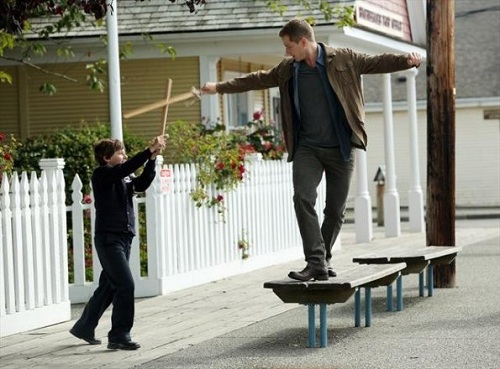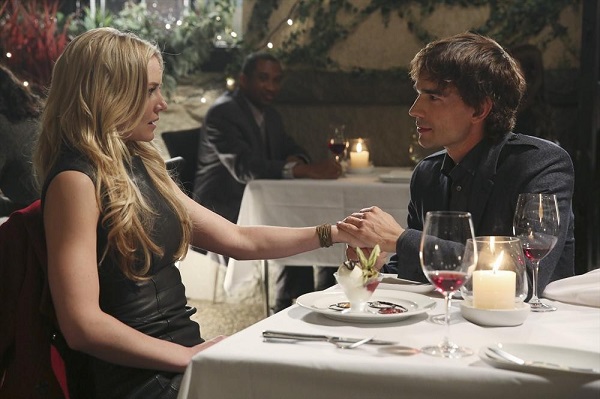Directed by Judd Apatow
Written by Judd Apatow
USA, 2012
Over the past decade, Judd Apatow the writer has made a calculated effort to mature himself, while Judd Apatow the producer indulges in his childish side. The films he’s directed have gotten progressively less raunchy and more introspective, as he’s explored unexpected pregnancies, personal and professional shifts, and modern sexual politics. He does so cheekily, but at his best—specifically in his debut, The 40-Year Old Virgin—Apatow is able to analyze and delve into the flaws and foibles of his main characters, making them relatable and distinctive. With This Is 40, arguably his most personal work so far, he’s sometimes able to balance realism with raunch; however, his tendencies to overextend himself end up making the story aimless, scattered, and meandering.
The movie, a so-called “sort-of sequel” to Knocked Up, focuses on Debbie (Leslie Mann) and Pete (Paul Rudd), the bickering married couple who stood as a harsh portrait of what may be in store for the characters played by Katherine Heigl and Seth Rogen. Now, we’re sticking with Debbie, Pete, and their two daughters as Mom and Dad face their 40th birthdays. Debbie, with little success, tries to lie about her age and keep her clothing store afloat while Pete struggles to reconcile his passion for solid if unpopular rock music and his ability to make his indie record label any money. This shoestring plot, bolstered by both spouses keeping secrets from each other that pile up with each new frustration, is the puttering engine behind This Is 40. Apatow uses it to let Mann, Rudd, and pretty much every other actor who’s ever been in an Apatow production to riff off each other, in ways intended to be honest, painful, and sometimes funny.
Where This Is 40 suffers is, unsurprisingly these days, its length. Though the film, at 134 minutes, isn’t Apatow’s longest, it likely could’ve been shorter without losing much. Apatow’s key problem as a filmmaker is emphasized through this issue: he’s not yet able to back away from more childish things. Rudd and Mann are quite good as Pete and Debbie, a couple whose love is still visible if not totally present as they shout at each other all the time. And watching them try to avoid the pitfalls of their respective fathers, played superbly by Albert Brooks and John Lithgow, is a fascinating subplot. (Frankly, the third act, which takes place mostly at Pete’s birthday party, is strongest because Brooks and Lithgow get a number of interactions, all of which are excellent.) The seams start to show when the film focuses on Sadie and Charlotte, Pete and Debbie’s daughters (played by Maude and Iris Apatow, Apatow and Mann’s real-life children), and their troubles, because that’s where the film begins to tap into an unwanted reserve of broad comedy.
The outwardly comic elements are represented in Pete and Debbie’s work environments, too, with no point or purpose. Pete’s trying to reunite The Rumor, a band he loved when he was younger, but can’t accept that no one cares enough anymore to buy their new record. His back-and-forth conversations with his co-workers, played by Chris O’Dowd and Lena Dunham, aren’t unfunny yet they appear to be shipped in from another movie. Debbie’s dealing with a potential thief among her employees, including Charlyne Yi and a surprisingly funny Megan Fox. However, these subplots, especially the latter, go nowhere. In addition, a late-in-the-game encounter with a furious fellow parent played by Melissa McCarthy feels like an excuse for Apatow to pay her a favor for being the best part of the otherwise bloated Bridesmaids. Here and elsewhere, This Is 40 is less like a film and more like a pastiche of goofy home movies presented to an unsuspecting audience.
Despite all of these issues, This Is 40 isn’t bad. Brooks, in particular, is as good here as he was in last year’s Drive, as a different kind of villain, the guilt-tripping parent. Each time he’s on screen, it’s a breath of fresh air. His bundled-neuroses attitude is clearly one of Apatow’s inspirations; thankfully, the character he plays isn’t treated reverentially. Brooks’ comic-icon status aside, he gets to be as blunt and awkward as anyone else in This Is 40. There are also times when the film has an appropriate blend of humor, pathos, and pain. Unfortunately, some of the time, that pain—as seen in innumerable family spats—is just too smothering, too off-putting.
Judd Apatow is still finding himself as a director. If nothing else, This Is 40 is a compelling bit of self-exploration, even if it’s not entirely successful. It’s hard not to see him as Pete, an artist who’s unwilling to sacrifice his integrity to make money. All Pete can hope for is that he’ll find a musician he loves who’s also embraced by mass audiences, without losing his soul. Apatow, despite being too generous a director and still too raucous in some of his comic tastes, has rarely if ever sold out to make a fast buck. This Is 40 doesn’t coalesce into a coherent whole, but is a loose, engaging experiment. Hopefully soon, Apatow will once again figure out the ingredients for pure success.
— Josh Spiegel







